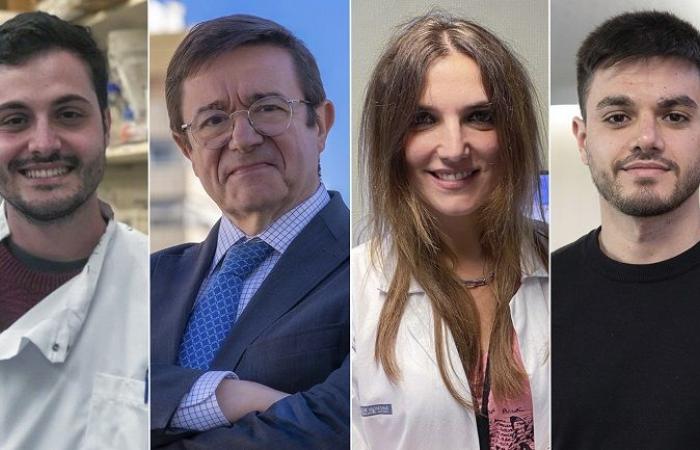The study results Whole exome tumor-agnostic ctDNA analysis enhances minimal residual disease detection and reveals relapse mechanisms in localized colon cancer’ They have just been published in the prestigious scientific journal Nature Cancer. The main objective of the study was to improve the early detection of relapses in patients with localized colon cancer (stages II and III), through an advanced and non -invasive technique based on blood tests capable of detecting more precision if a patient with operated colon cancer will fall, before it is even visible by image.
Using a test developed by the equipment (TAV16), based on the sequencing of the complete exoma of the circulating tumor DNA (CTDNA) in blood samples of patients with localized colon cancer, it was possible to identify with greater sensitivity than ever the presence of minimal residual disease after surgery, which allows anticipating which patients will fall and who could avoid unnecessary treatments.
Patient samples
Samples were analyzed in three key moments: in the diagnosis, after surgery and at the time of relapse. The study included a Spanish cohort of 25 patients and another international validation cohort in Denmark, which consisted of 15 patients, thus confirming the solidity of the results.
In addition, complementary techniques such as the transcriptomic and proteomic analysis of tumor tissues were incorporated, which allowed better to understand the molecular mechanisms involved in immune progression and evasion.
The study has revealed for the first time that the one that tumor cells escape, in the initial phase, of the regulation of the immune system could be one of the main causes of relapse in these patients, which opens a new door to immunotherapy in early phases of colon cancer, something never raised so far.
Multidisciplinary project
This multidisciplinary project has been led by the Colorrectal Cancer Research group and new therapeutic developments in solid inclusive tumors, linked to the Medical Oncology Service of the University Clinical Hospital of Valencia, under the direction of doctors Noelia Tarazona and Andrés Cervantes, of the aforementioned group, both researchers of the Biomedical Research Center in Cancer Network (CIBERONC) of the Institute of Health. He has also had an essential contribution of postdoctoral researchers Jorge Martín Arana (main author of the publication and whose doctoral thesis is based on this study) and Francisco Gimeno Valiente, of the same group, in addition to clinicians, bioinformatics, biologists and biotechnologists.
Dr. Noelia Tarazona is currently continuing her investigations at the Mass General Brigham Cancer Center, in Boston (United States) and Dr. Francisco Gimeno Valiente, at the University College London Cancer Institute and Francis Crick Institute, in London (United Kingdom).
This work has been possible thanks to the Biobanco platforms, the Precision Medicine Unit and the Bioinformatics Unit of Incliva. The Colloproctology Surgery Team of the University Clinical Hospital of Valencia deserves a special mention, whose involvement has been fundamental for obtaining high quality tumor samples.
Tumor organoids
Thanks to its collaboration, it was possible to establish tumor organoids, a three -dimensional model that has allowed to test new therapies directed in conditions very similar to those of the real patient. This approach has contributed decisive added value to the study, by bringing molecular findings to concrete therapeutic strategies.
The project has had the outstanding collaboration of the Department of Molecular Medicine of Aarhus University Hospital (Denmark), led by Dr. Claus Lindbjerg Andersen, which has been responsible for the international validation cohort. The Danish Cancer Biobank and the Colorectal Cancer Research Biobank have also actively participated, facilitating access to key biological samples for the study.
About colorectal cancer
Colorectal cancer is one of the great challenges in oncology: it is the third most frequent tumor in the world and the second cause of cancer death, with almost 2 million cases per year. In Spain, more than 44,000 new cases are diagnosed every year.
Currently, decisions about treatment after surgery are still based on pathological anatomy and that entails two major problems: up to 30% -40% of patients fall, despite having been considered cured; And between 60% -70% they receive unnecessary chemotherapy, with important toxicities and a high sanitary cost.
Faced with this reality, the research team set out to develop a more precise, non -invasive and applicable tool to all patients, which would identify who really has a risk of falling and acting on time. And he succeeded with the TAV16 test, which multiplies the sensitivity of the current tests and can be applied without having an original tumor sample.
TAV16 technology was compared to current methods, demonstrating greater residual disease detection (sensitivity between 87% and 100%) and high technological transfer potential, already protected by patent.
Part of the equipment was funded by the Generalitat Valenciana and Feder Funds. The research has also obtained financing from the Carlos III Health Institute (PI21/00689), SEOM (Spanish Society of Medical Oncology) and the TTD group (treatment of digestive tumors), as well as the Novo Nordisk Foundation and Danish Society against Cancer.






